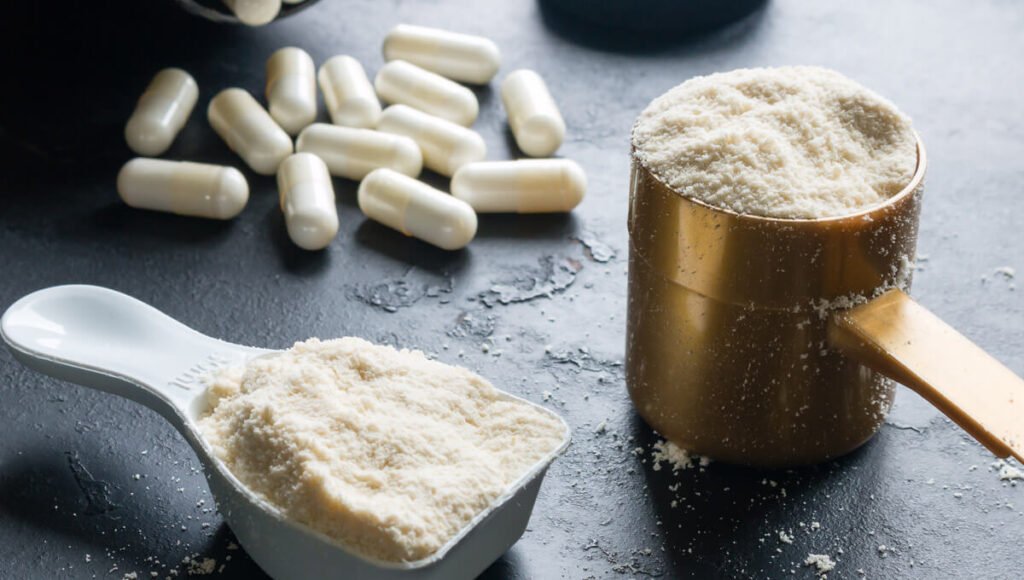Fall 2023
Can creatine aid in concussion recovery?

Creatine is a non-protein amino acid primarily found in skeletal muscles. The main role of creatine is to maintain energy homeostasis by keeping cellular ATP levels constant in cells that exhibit high and fluctuating energy demands, such as muscle and brain cells.
Exogenous sources are supplied by animal products, such as red meat and fish, whereas endogenous creatine is formed and stored in the liver, kidney, and pancreas. The body produces about 1g/day of creatine, with another 1g/day coming from the diet. The body also breaks down about 1–2% of creatine in the muscle per day into creatinine, though this can be greater in individuals with larger muscle mass or with higher activity levels. In addition, those who are not consuming red meat and/or fish on a daily basis may not be able to fully saturate body stores of creatine without supplementation.
Creatine Content in Foods
| Food | Creatine Content (g/lb) | Creatine Content (g/kg) |
| Cod | 1.4 | 3.0 |
| Beef | 2.0 | 4.5 |
| Herring | 3.0-4.5 | 6.5-10.0 |
| Milk | 0.05 | 0.1 |
| Salmon | 2.0 | 4.5 |
| Pork | 2.3 | 5.0 |
| Tuna | 1.8 | 4.0 |
Creatine has become a popular supplement in the sports performance world, especially since it has been heavily researched, with strong evidence proving its effectiveness. It is marketed to improve athletic performance by increasing strength and muscle mass. Creatine supplementation can achieve this by increasing your phosphocreatine (PCr) stores, which helps to resynthesize ATP. In times of high energy demand, a CK enzyme can regenerate ATP from these PCr stores. The synthesis of ATP occurs when creatine kinase (CK) catalyzes the reversible reaction of PCr combined with adenosine diphosphate (ADP). This can decrease muscle fatigue by prolonging the phosphocreatine shuttle, which is the predominant ATP source for short-duration, high-intensity exercises. Researchers have also investigated other possible health-related uses for creatine supplementation, such as sarcopenia, osteoporosis, rehabilitation, cardiovascular health, and brain health. When it comes to concussion prevention and treatment, there is growing interest in understanding and testing how humans could benefit from creatine supplementation.
Creatine and the Brain
The brain consumes about 20% of an individual’s resting energy expenditure. It is constantly working whether you’re awake or asleep, so it requires a constant supply of energy from ATP. Research has shown that creatine supplementation can increase brain creatine content by 3-10%, specifically by supplementation of creatine monohydrate. Individuals may need higher levels of creatine supplementation (>5g/day) for longer periods of time to increase brain concentrations of creatine as brain levels seem to increase more slowly than those in the muscle in response to supplementation.
There has been emerging interest in showing how creatine supplementation may benefit brain health, including cognitive processing, brain function, and recovery from trauma. Much of the research assessing the efficacy of creatine supplementation has been evaluated using creatine monohydrate. Other forms, such as creatine citrate, creatine serums, creatine ethyl ester, or creatine nitrate, have not been proven to promote a greater creatine uptake and retention than creatine monohydrate. Therefore, the research on creatine and concussions focuses on supplementation with creatine monohydrate.
Concussions
Following a mild traumatic brain injury (mTBI), also known as a concussion, ATP demand is altered due to hypoxia and decreases in blood flow and brain creatine levels. There is also large-scale membrane depolarization, which requires large amounts of ATP to repolarize. As a result, symptoms following a concussion include headache, dizziness, and light and sound sensitivity. The phosphocreatine system can replenish ATP efficiently, even in high energy demand, low oxygen environment. As a result, creatine plays an important role in helping the brain meet these increased ATP demands following a mTBI, which may be just one mechanism behind how prophylactic creatine supplementation could be beneficial in alleviating post-concussion symptoms.
There is also evidence that creatine may help with the altered metabolic environment following a mTBI, characterized by increased intracellular calcium, apoptosis, and oxidative stress. This stressful environment can cause the formation of mitochondrial permeability transition pores (mPTP), a protein found in the membrane of the mitochondria that is linked to apoptosis. Creatine may be able to protect against the factors involved in their formation, as well as stabilize them, which can prevent cell death. Creatine may also reduce the occurrence of reactive oxygen species (ROS) forming, acting as an antioxidant to reduce oxidative stress following a mTBI. As a result, supplementation with creatine may decrease an individual’s vulnerability for Second Impact Syndrome, which is associated with the altered metabolic environment following a concussion.
Summary
Following a concussion, omega-3 fatty acids, and magnesium are common supplements provided and/or recommended that may help with post-concussion symptoms. Because of the large role creatine plays in resynthesizing ATP in the brain, the addition of creatine supplementation to a post-concussion protocol may also be an emerging intervention. Due to the energy crisis following a concussion, creatine may help the brain meet these higher energy demands by increasing the rate at which ATP resynthesizes. Creatine supplementation may also reduce the side effects associated with the altered metabolic environment in the brain following a concussion, including increased intracellular calcium, apoptosis, and oxidative stress.
» ALSO SEE: Strategies for training Midshipmen student-athletes
While these potential mechanisms seem to be promising, there are currently zero clinical research studies done in athletes testing whether supplementation directly improves outcomes following a concussion. However, it is still important for medical professionals in the sports environment to consider the benefits that creatine supplementation can have when dealing with concussions, and to stay alert for how future randomized controlled trials guide its potential use.
Written by a Collegiate and Professional Sports Dietitians Association Registered Dietitian (RD). To learn more about sports nutrition and CPSDA, go to www.sportsrd.org.



